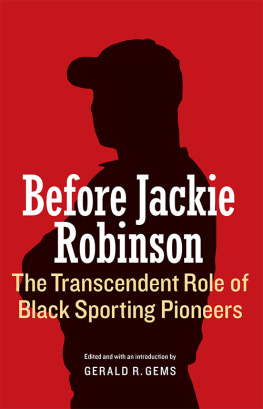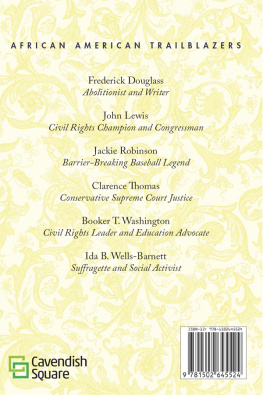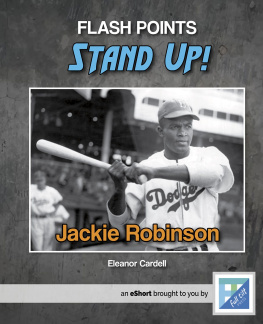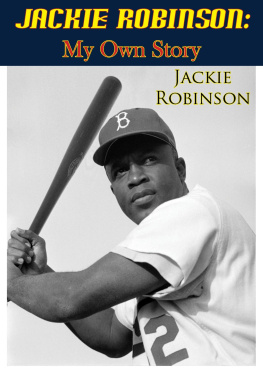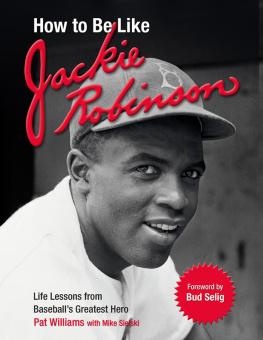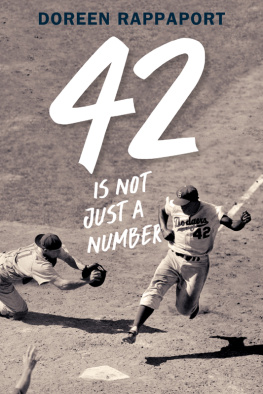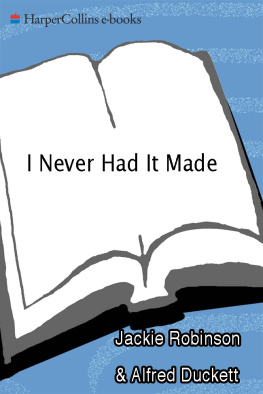Before Jackie Robinson
Here you can read online Before Jackie Robinson full text of the book (entire story) in english for free. Download pdf and epub, get meaning, cover and reviews about this ebook. year: 2016, publisher: University of Nebraska Press, genre: Politics. Description of the work, (preface) as well as reviews are available. Best literature library LitArk.com created for fans of good reading and offers a wide selection of genres:
Romance novel
Science fiction
Adventure
Detective
Science
History
Home and family
Prose
Art
Politics
Computer
Non-fiction
Religion
Business
Children
Humor
Choose a favorite category and find really read worthwhile books. Enjoy immersion in the world of imagination, feel the emotions of the characters or learn something new for yourself, make an fascinating discovery.
Before Jackie Robinson: summary, description and annotation
We offer to read an annotation, description, summary or preface (depends on what the author of the book "Before Jackie Robinson" wrote himself). If you haven't found the necessary information about the book — write in the comments, we will try to find it.
Unknown: author's other books
Who wrote Before Jackie Robinson? Find out the surname, the name of the author of the book and a list of all author's works by series.
Before Jackie Robinson — read online for free the complete book (whole text) full work
Below is the text of the book, divided by pages. System saving the place of the last page read, allows you to conveniently read the book "Before Jackie Robinson" online for free, without having to search again every time where you left off. Put a bookmark, and you can go to the page where you finished reading at any time.
Font size:
Interval:
Bookmark:
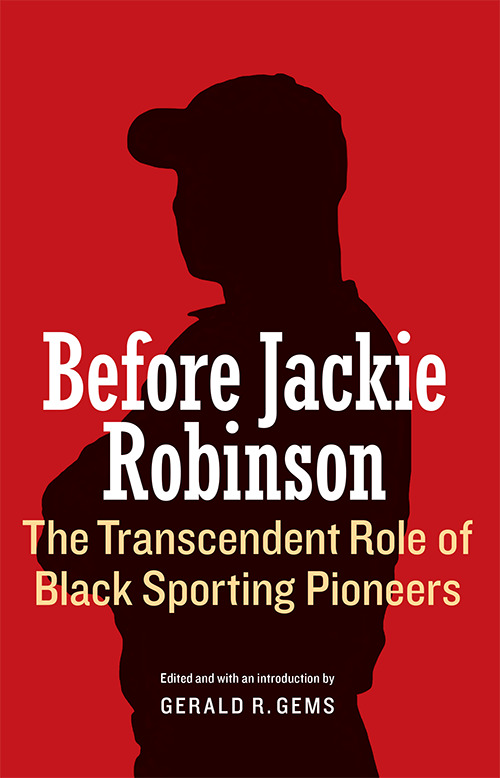
This anthology will serve as a tantalizing introduction to race and sport.
Donald Spivey, professor of history at the University of Miami and the author of Black Pearls of Wisdom: Voicing the African-American Journey for Freedom, Empowerment, and the Future.
Edited and with an introduction by
Gerald R. Gems
University of Nebraska Press
Lincoln & London
2017 by the Board of Regents of the University of Nebraska
Cover designed by University of Nebraska Press; cover image manipulated from istockphoto.com/4x6.
Author photo courtesy North Central College.
Portions of chapter 1 previously appeared in Pellom McDaniels III, The Prince of Jockeys: The Life of Isaac Burns Murphy (Lexington: University Press of Kentucky, 2013). Used with permission.
All rights reserved
Library of Congress Control Number: 2016956312
The publisher does not have any control over and does not assume any responsibility for author or third-party websites or their content.
Gerald R. Gems
Pellom McDaniels III
Sarah Jane Eikleberry
Gerald R. Gems
Michael E. Lomax
Bieke Gils
James E. Odenkirk
Susan J. Rayl
Robert Pruter
Murry Nelson
Robert Pruter
James Coates
Raymond Schmidt
Gerald R. Gems
Before Jackie Robinson is a cooperative effort to recover a significant part of the past. It attempts to fill a significant hole in the literature of our American history. Why does that matter? Our personal histories make us who we are as individuals, and our collective histories provide us with a national identity as Americans. One of the characteristics of American culture that differentiates it from so many others in the world is the influence of race in American history. The genre of new biography that has emerged in the twenty-first century places greater emphasis on the socially contested nature of identity constructions, so that it treats biography as acts of identity politics in the social struggles of a time, a method that allows social groups to reach an understanding about who they are and who they want to be. This volume makes a distinct attempt to incorporate the factors of race and race politics over a transitional period in American history that eventually transformed the nature of American society and American history.
The choice of subjects provides a sense of chronological change and the incremental transition in race relations in American culture over approximately a half century. Sports provided a very visible means of that process. While many Americans might be familiar with Jack Johnson, Joe Louis, and Jesse Owens, all of whom operated on an international stage, we chose to examine the lives of no less important athletic pioneers, once well known but increasingly forgotten, who pushed the social boundaries on other levels in their quest to dismantle racism.
Slavery commenced with some of the earliest colonial settlers in 1619 and held a central role in the American economy and society for the next 250 years. The Civil War, which pitted Americans and even families against one another, is attributed to the enslavement of African Americans. It cost more than six hundred thousand American lives, the greatest disaster in the history of the nation.
With the end of the Civil War and the reorganization of the defeated Confederate states, a period known as Reconstruction, the undertaking offered hope and promise to the newly liberated slaves. That optimistic expectation proved illusory and temporary. When the presidential election of 1876 resulted in a stalemate, the two political parties reached an agreement that gave the presidency to the Republican candidate, Rutherford B. Hayes, but allowed the Democrats to resume their previous control of the southern states. Restrictive suffrage qualifications, complete disenfranchisement, Jim Crow segregation laws, and the sharecropping system quickly returned blacks to a state of peonage, reinforced by widespread lynchings, the ramifications of which still beset the American society today.
A former slave, Booker T. Washington, founded the Tuskegee Institute in Alabama in 1881; it taught vocational skills and provided black teachers for the segregated schools. Rather than social equality Washington preached the acquisition of skills for the workplace. His accommodationist and non-threatening philosophy won him support from white leaders and recognition as the top black spokesperson of the late nineteenth century. Under such guidance athletes found some limited opportunity in the dominant white culturebut not equality. Blacks faced continual denigration and stereotyping and were often depicted as cartoonish minstrels or Sambo figures in the white media, incapable of full inclusion in the white mainstream society.
Jockeys such as Isaac Murphy, Willie Sims, and Jimmy Winkfield won numerous Kentucky Derby races from 1884 to 1902 and earned considerable sums for their skills, but they were only the employees of wealthy owners who garnered the larger prizes and national acclaim.
Lewiss ascendance represented a black invasion of the white power structure, but his talents overcame prejudice. Other northern blacks began to test white assumptions of superiority in other forms of sport. Like in horse racing, blacks were expected to serve wealthier golfers as caddies in an employer-employee relationship. When John Shippen, who had learned to play golf as a caddie for whites, entered the sacrosanct U.S. Open in 1896, the other entrants arranged a boycott. Only the courageous efforts of U. S. Golf Association ( USGA ) president Theodore Havemeyer, who supported Shippen, saved the tournament. Shippen represented a challenge to the white concept of the self-made man, presumably reserved for white males. A loss to a non-white could damage the perception of white racial superiority, a basic tenet of the racist society that upheld white privilege. Shippen continued to challenge white hegemony, entering the tournament repeatedly in 1899, 1900, 1902, and 1913. The USGA would eventually adopt a whites-only policy. Such exclusionary tactics resulted in black golfers
Cyclist Major Taylor personified another such provocation as his abilities clearly surpassed that of his white opponents as he set numerous world records in head to head competition and won the world championship by 1899. His success fostered the animosity of white cyclists and their collusion to hinder his efforts forced him to seek his fortune abroad, where he earned as much as $10,000 annually. Such physical prowess offered one means of social mobility when other avenues were denied.
Such head-to-head individual competitions challenged the dominant Social Darwinian beliefs in white superiority. Boxers had already confronted that awareness by the late nineteenth century. White perceptions of blacks as physically inferior, weak-willed, cowardly, lacking in toughness and personal discipline, and unable to withstand a stomach punch enabled black fighters to enter the professional ring. White audiences expected to see and enjoyed watching black boxers being pummeled by white opponents. White men organized battle royals in which black youth were thrown in a ring, sometimes blindfolded, to fight until the last one standing was awarded with cheers or coins. At the professional level John L. Sullivan, who held the heavyweight championship from 1882 to 1892, instituted a ban on black challengers to ensure that the symbolic title of physical supremacy remained in white hands.
Font size:
Interval:
Bookmark:
Similar books «Before Jackie Robinson»
Look at similar books to Before Jackie Robinson. We have selected literature similar in name and meaning in the hope of providing readers with more options to find new, interesting, not yet read works.
Discussion, reviews of the book Before Jackie Robinson and just readers' own opinions. Leave your comments, write what you think about the work, its meaning or the main characters. Specify what exactly you liked and what you didn't like, and why you think so.

